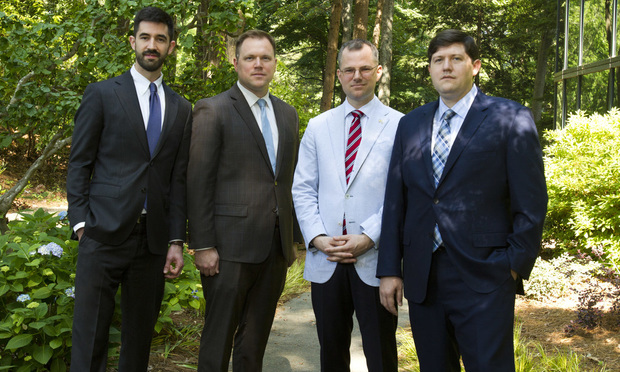Fulton Jury Awards $9.6M to Family of Man Killed in Fall at MARTA Station
The plaintiffs' lawyer had to overcome evidence that the deceased man was extremely intoxicated before he fell through a gap in a wooden guardrail.
May 14, 2018 at 12:54 PM
6 minute read

A Fulton County jury delivered a post-apportionment award of nearly $9.6 million to the son and estate of a man killed when he fell through a missing guardrail at the Civic Center MARTA station, plunging more than 20 feet to his death.
The plaintiffs' lawyers said MARTA attempted to shift the blame onto the deceased, arguing Carlos Hicks was drinking heavily before the accident, and had a blood alcohol content of 0.311 percent, almost four times the limit for legal impairment.
“We admitted that up front. Our first words were 'Carlos was drinking, he needed a ride home,'” said Chris Newbern. “Our position is that MARTA holds itself out as a designated driver for people who've been drinking. It's not illegal to be drunk.”
Newbern's law partner, Ed Piasta, said MARTA turned down a $5 million settlement offer earlier this year.
“They never responded, they never reached out even during trial,” said Piasta. “We didn't make any offers during trial either, and there was no talk of high-lows.”
The lawyers and their Piasta Newbern Walker partner Michael Walker handled the case with assistance from Darren Summerville and Max Thelen of the Summerville Firm.
MARTA was defended by Thomas “Woody” Sampson II, Jeffrey Tompkins and Gerond Lawrence of Thomas Kennedy Sampson & Tompkins.
Sampson said he made an oral motion for judgment notwithstanding the verdict when it was delivered, which Fulton County Superior Court Judge Wendy Shoob took under advisement. Failing that, he said, “we're definitely going to appeal.”
According to the lawyers and court filings, Hicks, 42, was on the upper level of the MARTA station around 7 p.m. in February 2013. A metal guardrail was removed and replaced several years earlier as part of a never-completed construction project to build a second Twelve Centennial Park Hotel adjacent to the station. The project was canceled in 2007 when the economy hit the skids.
The metal guardrail was replaced by a wooden one, but a section of it fell off, according to plaintiffs' filings. That left a 25-inch hole in the guardrail at least seven months before the accident.
The defense portion of the pretrial order said video showed Hicks leaning on an adjacent concrete “parapet” wall next to the hole for several minutes, then turn and step back in an apparent attempt to again lean against the parapet.
“Hicks, however, did not make it,” the defense account said, and “fell through the open hole that he had had been standing next to for at least the preceding seven minutes.”
In addition to having a 0.311 percent BAC, Hicks was carrying an unopened bottle of vodka, the defense said.
Hicks' son, Pissaro Wright, and sister and estate administrator Christina Hicks sued MARTA in Fulton County Superior Court.
MARTA claimed the developers of the hotel project, Novare Centennial Park and Portal Holdings, were liable for the accident because they removed the metal handrail years earlier and never replaced it. MARTA brought them into the case as nonparty defendants, and they were listed on the verdict form but did not participate at trial, Newbern said.
During a two-week trial, MARTA presented testimony by a toxicology expert concerning the volume and effects of alcohol that would have been present in Hicks' body, and a lighting expert “who said the area was well-lit, which was disputed,” Newbern said.
The plaintiffs did not call any experts, the lawyers said, but they did introduce testimony from Randy Hanzlick of the Fulton County medical examiner's office.
“He was [a] hero,” said Piasta. “The MARTA police originally called it [a] suicide. He determined it was an accident.”
In addition to faulting Hicks, the plaintiffs' lawyers said MARTA argued it was unaware of the missing guardrail because the hotel developers never notified it.
“The problem with that was that MARTA moved a bus stop there three years after the construction ended,” said Newbern.
“Our position was that Novare had not been on-site for five years,” he said. “It was MARTA's bus station, MARTA's wall and MARTA's problem.”
“One issue at trial was that Carlos was unemployed throughout his life,” said Newbern. “He lived with his elderly parents. His father died of leukemia shortly after he died, and he was their caretaker. During my last closing, I communicated that his life had tremendous value.”
“The last thing MARTA did was put in a demonstrative exhibit of how much Carlos drank. They put into evidence a 750 milliliter bottle,” said Piasta. “I grabbed the bottle and said, 'This is a lot of liquor. That doesn't mean he had to die. Maybe Carlos needed help, but he needed a ride home first.'”
Newbern said he asked for between $12 million and $20 million for a wrongful death at closing, and $3 million for pain and suffering.
After about a day-and-a-half of deliberations, the jury awarded $11.25 million, but apportioned 10 percent of the liability to Hicks and 5 percent to the contracting companies, leaving MARTA liable for nearly $9.6 million.
Sampson said he spoke with some of the jurors afterward.
“Some of them were a little confused about superior knowledge and what the plaintiffs had to prove to prevail,” he said. “I feel good about our chances on appeal.”
“We enjoyed trying the case in front of Judge Shoob, and the plaintiffs' lawyers did a great job,” Sampson said. “My hat's off to them.”
The trial was the first for Newbern, Piasta and Walker since they set up shop together in January, and the trial had to be reset to an earlier date than originally scheduled because Piasta is shipping out with his Army National Guard unit later this month.
This content has been archived. It is available through our partners, LexisNexis® and Bloomberg Law.
To view this content, please continue to their sites.
Not a Lexis Subscriber?
Subscribe Now
Not a Bloomberg Law Subscriber?
Subscribe Now
NOT FOR REPRINT
© 2025 ALM Global, LLC, All Rights Reserved. Request academic re-use from www.copyright.com. All other uses, submit a request to [email protected]. For more information visit Asset & Logo Licensing.
You Might Like
View All

Evidence Explained: Prevailing Attorney Outlines Successful Defense in Inmate Death Case


Trending Stories
- 1No Two Wildfires Alike: Lawyers Take Different Legal Strategies in California
- 2Poop-Themed Dog Toy OK as Parody, but Still Tarnished Jack Daniel’s Brand, Court Says
- 3Meet the New President of NY's Association of Trial Court Jurists
- 4Lawyers' Phones Are Ringing: What Should Employers Do If ICE Raids Their Business?
- 5Freshfields Hires Ex-SEC Corporate Finance Director in Silicon Valley
Who Got The Work
J. Brugh Lower of Gibbons has entered an appearance for industrial equipment supplier Devco Corporation in a pending trademark infringement lawsuit. The suit, accusing the defendant of selling knock-off Graco products, was filed Dec. 18 in New Jersey District Court by Rivkin Radler on behalf of Graco Inc. and Graco Minnesota. The case, assigned to U.S. District Judge Zahid N. Quraishi, is 3:24-cv-11294, Graco Inc. et al v. Devco Corporation.
Who Got The Work
Rebecca Maller-Stein and Kent A. Yalowitz of Arnold & Porter Kaye Scholer have entered their appearances for Hanaco Venture Capital and its executives, Lior Prosor and David Frankel, in a pending securities lawsuit. The action, filed on Dec. 24 in New York Southern District Court by Zell, Aron & Co. on behalf of Goldeneye Advisors, accuses the defendants of negligently and fraudulently managing the plaintiff's $1 million investment. The case, assigned to U.S. District Judge Vernon S. Broderick, is 1:24-cv-09918, Goldeneye Advisors, LLC v. Hanaco Venture Capital, Ltd. et al.
Who Got The Work
Attorneys from A&O Shearman has stepped in as defense counsel for Toronto-Dominion Bank and other defendants in a pending securities class action. The suit, filed Dec. 11 in New York Southern District Court by Bleichmar Fonti & Auld, accuses the defendants of concealing the bank's 'pervasive' deficiencies in regards to its compliance with the Bank Secrecy Act and the quality of its anti-money laundering controls. The case, assigned to U.S. District Judge Arun Subramanian, is 1:24-cv-09445, Gonzalez v. The Toronto-Dominion Bank et al.
Who Got The Work
Crown Castle International, a Pennsylvania company providing shared communications infrastructure, has turned to Luke D. Wolf of Gordon Rees Scully Mansukhani to fend off a pending breach-of-contract lawsuit. The court action, filed Nov. 25 in Michigan Eastern District Court by Hooper Hathaway PC on behalf of The Town Residences LLC, accuses Crown Castle of failing to transfer approximately $30,000 in utility payments from T-Mobile in breach of a roof-top lease and assignment agreement. The case, assigned to U.S. District Judge Susan K. Declercq, is 2:24-cv-13131, The Town Residences LLC v. T-Mobile US, Inc. et al.
Who Got The Work
Wilfred P. Coronato and Daniel M. Schwartz of McCarter & English have stepped in as defense counsel to Electrolux Home Products Inc. in a pending product liability lawsuit. The court action, filed Nov. 26 in New York Eastern District Court by Poulos Lopiccolo PC and Nagel Rice LLP on behalf of David Stern, alleges that the defendant's refrigerators’ drawers and shelving repeatedly break and fall apart within months after purchase. The case, assigned to U.S. District Judge Joan M. Azrack, is 2:24-cv-08204, Stern v. Electrolux Home Products, Inc.
Featured Firms
Law Offices of Gary Martin Hays & Associates, P.C.
(470) 294-1674
Law Offices of Mark E. Salomone
(857) 444-6468
Smith & Hassler
(713) 739-1250






